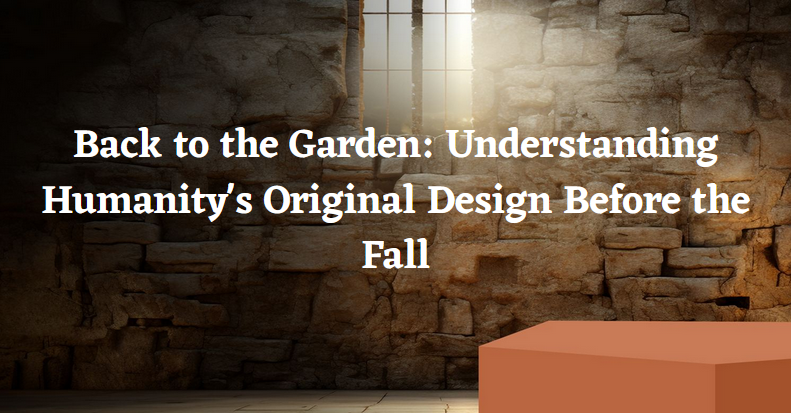
In the pages of Peter's Forgotten Sermon: The Lost Biblical Plan of Salvation and The Oneness of God, author Randall E. Messina leads us on a life-changing journey through scripture, theology, and spiritual reflection. He starts with the source of it all Eden. There was a world beautifully designed for humanity before there was sin, before shame, and before separation. Comprehension of what Eden lost is crucial for comprehending the importance of salvation and redemption in Jesus Christ.
The Original Blueprint for Humanity
Genesis depicts Eden not just as a garden of rich vegetation and crystal streams, but as a realm of complete spiritual, emotional, and physical equilibrium. Here, God put Adam and Eve, not to lounge in idleness, but to tend creation. There was work prior to the fall but it was joyful, purposeful, and unencumbered. Humanity's initial commission was one of partnership with God, dominion with purpose, and communion without shame.
Messina ponders Genesis 2:15, where the responsibility of Adam and Eve to "work and keep" the garden is noted. There was duty, but it was free from drudgery or strife. They strolled with God during the "cool of the day" a description that has been taken to be more than a time of day, but rather a symbol of spiritual tranquility.
Walking with God: Communion Without Separation
What is most striking in Messina's report is the closeness between the Creator and creation. No veils, no barriers, no rituals were there. God walked with man and woman in uninterrupted fellowship. This was not mere nearness; it was intimate, spiritual communion. This period of walking and teaching, says the author, was "discipleship in its purest form.
The implications run deep. Adam and Eve were privy to divine knowledge, saw God face-to-face without mediating agents, and lived in emotional and spiritual nakedness. They were not ashamed of their nakedness because they were covered with divine presence what Jewish tradition calls the Shekinah.
The Catastrophic Turn: Deception in the Garden
Chapter One of Messina's book, "The Fall of Mankind," details in theological richness the clever trickery of Satan, who employed a serpent to undermine God's ideal plan. What Messina is highlighting, and what most tend to ignore, is that Satan's plan was not one of outright rebellion but rather one of cunning diversion. He initially challenged God's word: "Did God really say…?" and subsequently contradicted it: "You will not surely die."
But the most crushing lie came with the serpent casting aspersions on God's intentions implying that God was hiding something good. Messina describes this as a sophisticated spin, where listening to God's generous command was reframed into a tyranny of oppression. Overnight, divine limits became cages, and rebellion seemed like enlightenment.
From Glory to Guilt: The Ripple of Rebellion
The moment Adam and Eve disobeyed God and took of the tree of the knowledge of good and evil, the disjunction occurred. They knew they were naked not just physically but spiritually. The garment of glory was lost. Fear caused them to hide. Shame prompted them to sew fig leaves. For the first time, there was separation not only between humanity and God, but between man and woman, between human beings and creation.
Messina points out the deep psychological and spiritual effect of the fall. Fear substituted love. Shame substituted openness. Blame substituted oneness. The sacred plan was broken.
Judgment and Mercy Entwined
With a keen insight, Messina proposes that God's reaction to the fall was judgment and mercy. Indeed, Adam and Eve were both sent out of Eden. Indeed, the serpent was cursed, childbearing became painful, and the ground would now yield thorns. But there was woven into the fabric of judgment, there was grace.
Genesis 3:21 tells us that God made skin garments for Adam and Eve a heavenly act that necessitated the first death in the creation. It was the first sacrifice. It was not man's work, but God's provision. There was shed blood. There was granted covering. And in Genesis 3:15, a promise was sown the seed of the woman would eventually crush the serpent's head.
The Forgotten Sermon Begins to Echo
By the time we get this far into Peter's Forgotten Sermon, we can feel the weight of what we lost and why salvation is not just a spiritual upgrade but a restoration in every sense. Eden was not just a lost place it was a lost state of the human soul. And through the redemptive plan outlined in Peter’s sermon at Pentecost, Messina argues, God reveals how we are to return not geographically, but spiritually to the presence and design of the Creator.
Conclusion: Eden as the Mirror
Understanding the fall is not only theological it's personal. We look at Adam and Eve and see ourselves in their fear, pride, and desire. And in their mirror, Messina gently leads the reader to a truth that resonates on every page of scripture: what was lost through the first Adam shall be regained through the second.
In the next installment, we’ll explore The Shedding of Blood and how Messina bridges the events of Eden to the foot of the cross.










Write a comment ...